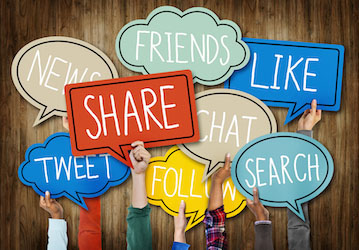As a Service Member, your behavior online can affect your health, safety, and military career, so it’s important to be thoughtful about your online presence. Does the amount of time you spend on social media affect your mental health or your relationships? Or does your public behavior online reflect the values of the military? Take some time to consider how to protect yourself so you can perform at your best.
How social media activities can impact military wellness
If you’re like many other people, you spend a significant amount of time (sometimes hours) each day on social media. But do you consider how it affects your well-being and productivity? Maintaining connectedness to friends and family, plus almost instantaneous access to information, are some of the reasons you might be drawn to social media. However, for some people, social media use can lead to depression and anxiety.
Exposure to cyber-bullying and offensive behavior can skew your view of human nature. Feelings of isolation and loneliness can grow if you have a lot of “friends” on social media, but your interactions with some of them aren’t good, or worse, you neglect other relationships in your life. Social media also can affect your attention and productivity by taking your focus away from what you should be doing. How can you develop healthy online habits and make the best of social media?
- Set clear boundaries for how much and when you will use social media. If you need some extra help to avoid temptation, consider looking for tools to block sites during times when you need to remain present and task-focused.
- Beware of comparing yourself to others on social media. Social comparison can lead to feelings of inadequacy or envy. People only post what they want others to see, and comparing yourself to others can become self-destructive.
- Be selective of what you see in your feed to focus on what adds to your life, and filter out what takes away from it. Emotions—positive and negative—are contagious. Pay attention to how the time you spend on social media affects how you feel, and make adjustments accordingly.
- Disconnect often if you realize you’re spending too much time on social media. Practice being more present with your friends, spouse, and family. Work toward gaining more face-to-face time with those who mean most to you. When face-to-face gatherings aren’t possible or safe, you can use your device for live, one-on-one conversations (such as video calls) rather than the less direct connection on social media.
Safe social media use in the military
While social media can help you stay in contact with friends, family, and others, it also can cause potential safety issues. For example, sharing too much information about where you are or what you’re doing by posting pictures or other types of information can sometimes compromise operational security (OPSEC). Family and friends might accidentally reveal something about your whereabouts to a wider audience than they realize. Even signing into your personal social media accounts while on duty can potentially compromise cyber security. Take a few simple steps to help stay safe.
- Turn off location and geotagging. If you’re on duty, at training, and especially when deployed, turn off your location service and geotagging on your personal devices.
- Use good practices. Take regular precautions such as keeping your passwords updated, locking your devices, and maintaining awareness of the sites you visit. Check your privacy settings regularly (including adjusting who can see your content), but remember: Social media is generally considered a public forum.
- Consider the safety of your family members. Make sure to talk with family members about how their social media content can affect you and your Service responsibilities. But beyond that, consider how to keep your children and teens safe online, especially while you’re away.
Social media conduct and your military career
There’s no reasonable expectation of privacy on social media (and many other public online forums). So your actions and behaviors can be witnessed by others—and subsequently reported for disciplinary action. Based on the Uniform Code of Military Justice (UCMJ), inappropriate use of social media can lead to punishable consequences. And while UCMJ doesn’t include specific language about social media, keep in mind that general punitive codes could be applied to harmful conduct online.
- Maintain respect for others and superiors. Posting derogatory comments about superior officers, disparaging the President and other government officials, and commenting inappropriately with offensive, discriminatory, or racist language are all punishable offenses.
- Regulate your emotions. While current events might inspire you to share your views and engage in discussions about what matters to you, the guiding principle for appropriate behavior should be rooted in the honor and respect deserved by the uniform. As a Service Member, your conduct and etiquette always should reflect those high standards. Practice managing your emotions before reacting online.
- Stay informed. Visit the DoD Social Media Hub for updated policies and links to social media portals for each Service branch. And learn more about behavior that’s punishable by UCMJ (see link above):
- Article 88: Contempt toward officials
- Article 89: Disrespect toward superior commissioned officer
- Article 91: Insubordinate conduct toward warrant officer, noncommissioned officer, or petty officer
- Article 133: Conduct unbecoming an officer and a gentleman
- Article 134: General article
The bottom line is that social media platforms are a major part of modern life, especially when in-person contact is limited. But while these platforms can be a helpful way to stay informed and even pass the time, unregulated social media use can also have negative impacts on your mental health, military wellness, and your military career. Consider making small adjustments so you can make the best of social media. And if you have children, take some time to make sure your kids are practicing healthy screen habits too.





